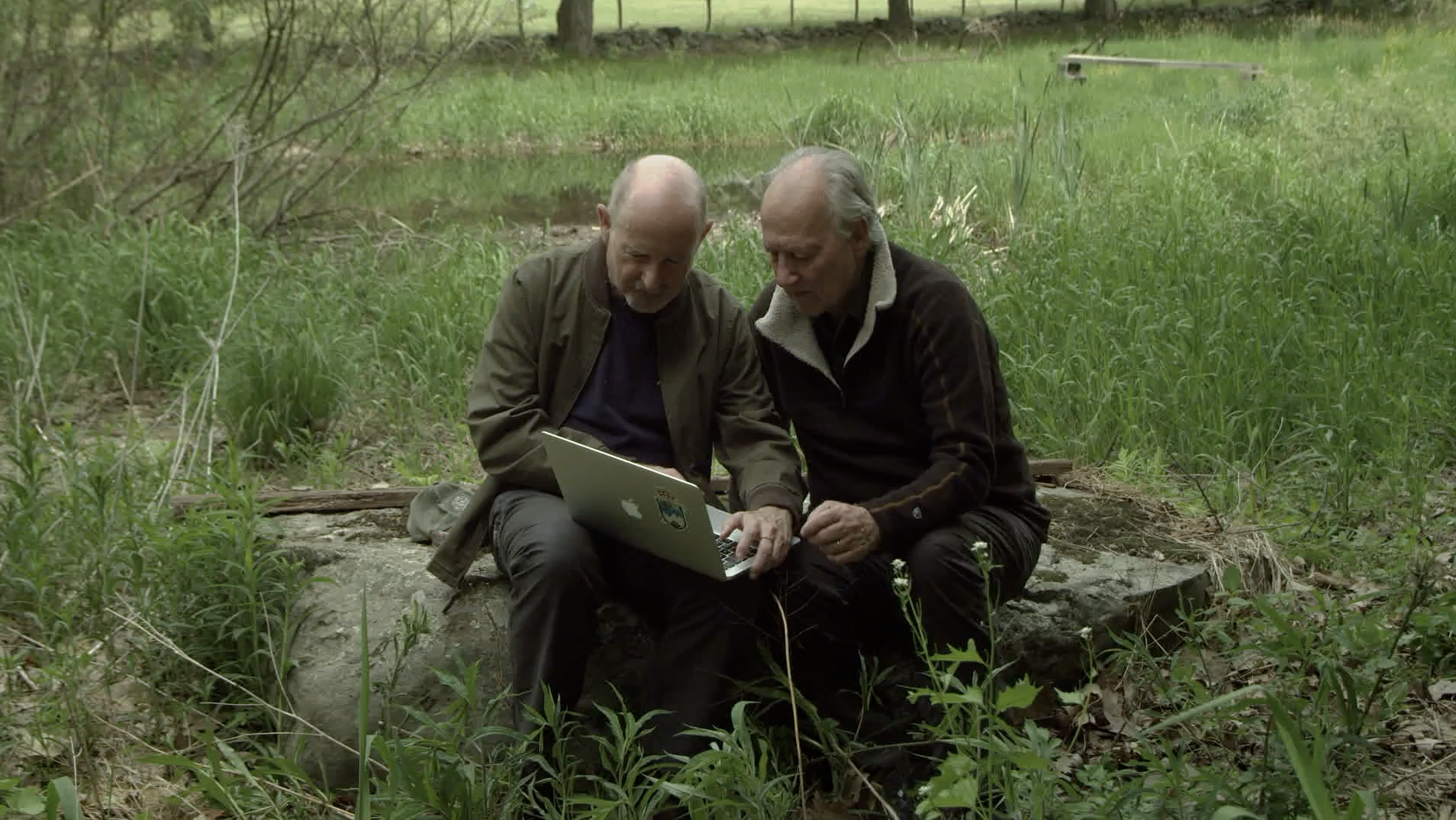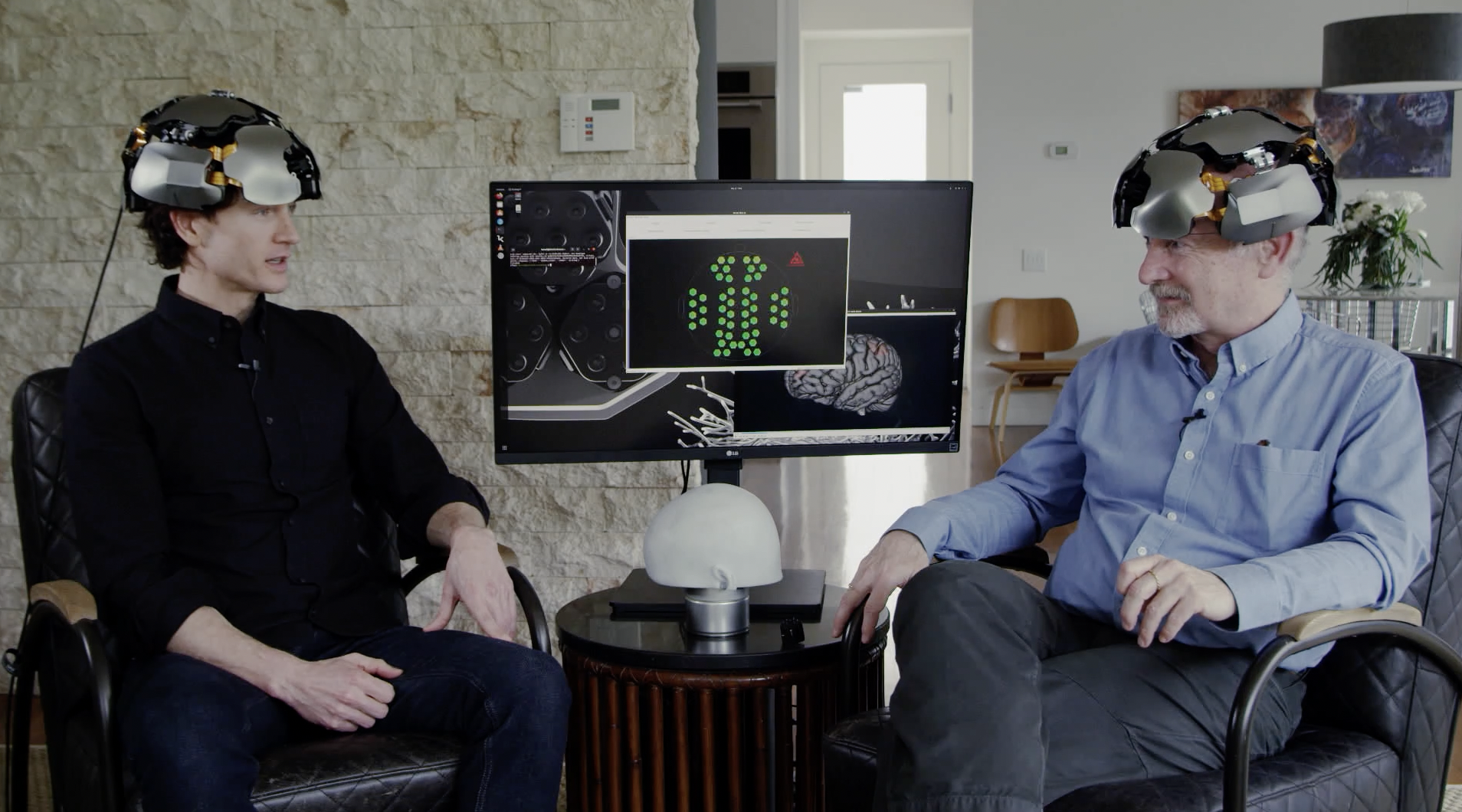
Theater of Thought
In Photo: Rafael Yuste (Left), Werner Herzog (Right)
The Neurorights Foundation teamed up with director Werner Herzog to create an extraordinary documentary film about the human brain, called Theater of Thought.
In Photo: Rafael Yuste, Luke Holwerda, Gus Holwerda, Lena Herzog, Werner Herzog.
About the Film
"Theater of Thought" is a captivating exploration of the human mind through the lens of legendary filmmaker Werner Herzog. In this thought-provoking documentary, Herzog delves into the complexities of consciousness, the mysteries of the human mind, and the nature of thought itself, engaging with leading experts from various fields. With his signature blend of philosophical inquiry and cinematic artistry, Herzog invites audiences to question the very essence of what it means to be human. A mesmerizing journey into the depths of the mind, Theater of Thought challenges perceptions and sparks introspection about our inner worlds.
The Neurorights Foundation offer free screenings of Theater of Thought to the following organization types:
1. Scientific/Research groups
2. Medical Campuses, Societies, and organizations
3. Academic/Educational groups, organizations, and institutions
4. Policy organizations, NGOs, government agencies, and governing bodies.
Any inquiries or questions regarding screenings should be directed to contact@neurorightsfoundation.org.

In Photo: Bryan Johnson (Left) Rafael Yuste (Right)
Film Interviewees
-
Depts. Materials Science and Engineering and Brain and Cognitive Sciences, MIT. She leads the Bioelectronics Lab, building the most advanced devices using magnetic and optical methods to modulate brain activity.
-
Dept. of Neuroscience, Columbia University. A molecular biologist, he earned the Nobel Prize for Physiology and Medicine in 2004 for his studies decoding the sense of smell. He provides a grand picture of the future of neuroscience.
-
Rockefeller University. An expert in genetic dissection of neural circuits, she was the Founding Head of Science of the Chen-Zuckerberg Initiative and helped pioneer the US and International BRAIN Initiatives.
-
UCSF Neurosurgeon. He is an expert in implantable brain devices to treat severe neurological conditions, and recently led a study to decode and synthesize speech using electrical recordings of the human cortex.
-
Jamie is the Treasurer of the Neurorights Foundation. He is also the co-founder and managing partner of Everyone, Inc., a venture studio that creates and invests in companies that deploy technology and regenerative economic strategies to advance health, learning, and economic opportunity. He is also a founding team member and board member of the Center for New Data, non-profit making information available to researchers, journalists, and policymakers to support public health, democracy, and other areas essential to the common good.
-
Dept. Neuroscience, Stanford University. A Brain Prize Winner, he is the main inventor of optogenetics, a method to optically activate neurons in animals, and control their behavior.
-
Dept. Neuroscience, Brown University. Founder of the Brown Institute of Brain Science and the BrainGate program, he is responsible for the most advanced patient studies using brain-computer interfaces.
-
Dept. Physiology, the University of Washington in Seattle. He developed the first brain-computer interfaces when he discovered in experiments with monkeys that you could use neuronal activity to control an external device.
-
Dept. Medicine, Weill Cornell Medical College and Adjunct faculty, Yale University School of Law. He is a physician expert in medical ethics and is the incoming president of the International Neuroethics Society.
-
Dept. Psychology, UC Berkley. He is the Director of the Brain Imaging Center and is arguably a world leader in decoding mental imagery using fMRI.
-
Jared is an international human rights lawyer and the Neurorights Foundation’s Secretary and General Counsel. He is a managing director of Perseus Strategies, a public interest law firm, a special advisor on the Responsibility to Protect to the Organization of American States, and an adjunct professor of law at Georgetown University Law Center.
-
Director of Research and Vice President of IBM. He leads IBM’s pioneering effort in quantum computing and is also deeply vested in, and has written Op-Eds about, the ethical use of technology.
-
Dept. Philosophy, the University of Washington in Seattle. World expert in the philosophy of identity and agency, she is the Director of the Ethics Thrust at the UW Center for Neurotechnology
-
CSO Cognixion. He was the creator of Siri, a personal assistant used by billions of people worldwide, and is widely considered a visionary in the world of artificial intelligence and neurotechnology.
-
Guido Girardi Lavín is a Chilean doctor and politician. He was a senator in district No. 7 for Santiago Poniente. He previously served as the president of that chamber.
-
Dept. Neuroscience, Princeton University. He has pioneered the use of fMRI to predict the mental activity of human subjects, particularly in the response to natural real-life events, including story-telling.
-
Founder & CEO Kernel Company. He is a tech billionaire, who is interested in advancing human knowledge about our brain states. His company built the first portable brain scanner, bringing neurotechnology to the consumer electronic market.
-
Head of the Allen Institute for Brain Science. Starting with his early work with Francis Crick, he is arguably the world expert in consciousness, having pioneered experiments and written several books on the subject.
-
Director of West Coast Research Science, Meta AI, and Affiliate Professor at the University of Washington. She is a mathematician and expert in cryptography, privacy, and data security, and has created robust algorithms for data encryption that are resistant to quantum computers and could be used to protect brain data.
-
LeDoux, a Professor of Neural Science and Director of the Emotional Brain Institute at New York University, is a world leader in the neuroscientific study of emotions. Contrary to popular wisdom, he argues that fear is not an innate product of the amygdala, but instead reflects higher cognitive interpretations and narrations of situations in life.
-
He is a French high-wire artist who gained fame for his high-wire walk between the towers of Notre Dame Cathedral in Paris, 1971, Sydney Harbour Bridge as well as his high-wire walk between the Twin Towers of the World Trade Center in New York City. He demonstrates the unique feature of the human brain in controlling equilibrium and balance with absolute precision.
-
Allen School of Computer Science and Engineering, the University of Washington in Seattle. He is the Director of the Center for Neurotechnology and has pioneered predictive coding theories of brain function as well as brain-to-brain communication using neurotechnology, as an early form of telepathy.
-
Professor of Electrical Engineering at Columbia University. A leader in the design of CMOS-based neuroelectronics, his team has built the most advanced brain-computer interfaces, including a wireless implantable device with 65,000 electrodes with read and write capabilities.
-
Dept. of Biological Sciences, Columbia University. A neuroscientist and Chair of the Neurorights Foundation. He pioneered calcium imaging of brain activity and holographic reprogramming of neural circuits. He also led the group of researchers that proposed the US and International Brain Initiative.
Recent Reviews











